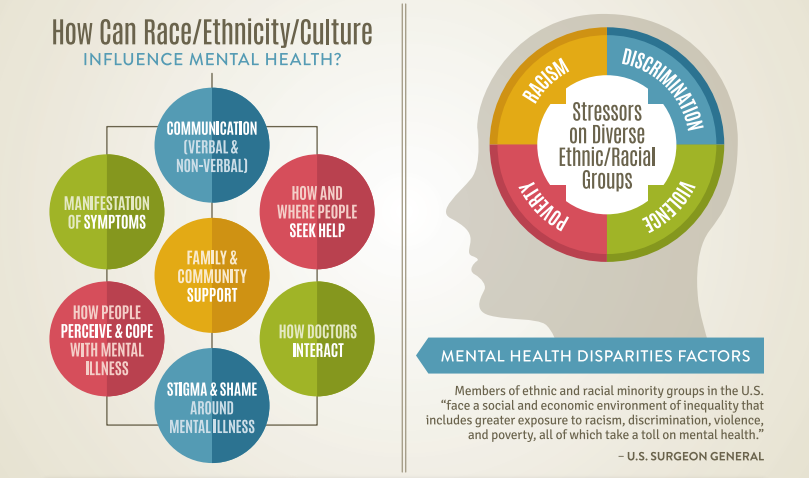Minority Mental Health Month
What is Cultural Competency
The AHA (American Hospital Association) defines a culturally competent healthcare system as one that “acknowledges the importance of culture, incorporates the assessment of cross-cultural relations, recognizes the potential impact of cultural differences, expands cultural knowledge, and adapts services to meet culturally unique needs.”
The first step in becoming culturally competent is to have self-awareness of your own cultural background and experiences. You must understand your own culture while recognizing the importance of limiting your influence when interacting with people from other cultures and with different life experiences. Author Maya Subramanian says, “our cultural beliefs not only impact the way we perceive mental health conditions and treatment, but also one’s accessibility to the proper resources.”
Why Cultural Competency is Important
There is plenty of data to show us that cultural competency in the health care system is essential for minorities to get the best care possible. A more specific definition for cultural competency in the healthcare and psychological setting says, “cultural competence refers to the ability for healthcare and mental health professionals to demonstrate open-mindedness and cognizance towards patients with diverse backgrounds and needs.” When cultural competency isn’t made a priority in a healthcare system, minorities suffer as a result. There are many issues associated with a lack of cultural competency when seeking phycological help as a minority. A few of the issues include:
- Being significantly under-represented in mental health research: resulting in professionals not knowing the best course of action
- Often receiving poorer quality of treatment, without regard to important factors in their life and background
- Being less likely to access available mental health services
- Being less likely to receive necessary mental health care
- Being under-represented by mental health professionals: Not having a professional a minority population can relate to, or even understand (due to language barriers, disabilities, or more)

Image source: namisa.org (American Psychiatric Association)
Lack of Cultural Competency Example
Demonstrates how a lack of cultural understanding adds to a patient’s discomfort
A Muslim woman comes to the doctor for a physical checkup and is asked to change into the paper scrubs provided for her. She doesn’t feel comfortable changing and says that she will keep the clothes on that she wore. The nurses report back to the doctor that the patient is being difficult and non-compliant. The doctor also notices a note in the patient’s file that she requests to see a female provider.
Cultural Explanation: In Muslim culture, modesty is very important for women. Traditionally, a woman’s arms, legs, and hair are covered to maintain a conservative appearance. Also, “as it relates to psychiatry specifically, Muslim women prefer a female mental health provider because it would violate the principles of modesty and conservatism to be alone in a room with a male physician or psychotherapist who is not her relative.” The patient in this example is not being non-compliant or difficult, the medical staff is just lacking cultural competence.
As our society becomes more multicultural and diverse, professionals in the field of healthcare must take the steps to become educated on understanding why cultural competence is essential. As the article mentioned, it’s impossible for healthcare professionals to give the best quality treatment without being aware of cultural barriers.
Subramanian says, “If we are all more open-minded and respectful of these differences, and make an attempt to understand each other better, we would move one step closer to eradicating pressing human-rights issues that deal with cultural bias and supremacy.” Understanding, respecting, and being aware of cultural differences will help us improve our mental health practices and make it possible for all people to have access to mental health resources and discussions.
Bethany has a diverse and competent mental healthcare staff that is ready to assist you. If you find yourself or a loved one struggling with your mental health, we encourage you to request an appointment with our team.








